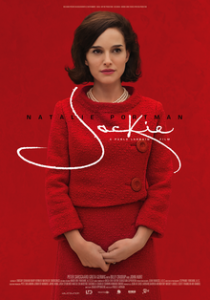film review: jackie

Academy Awards season is well and truly upon us, and now is the time to indulge in as many nominated pictures as physically possible. With nominations for Best Actress, Best Original Music Score, and Best Costume Design, Pablo Larraín’s biopic Jackie should absolutely be on every film goer’s list.
From the first minute of the film, it is abundantly clear why Natalie Portman has been nominated for her lead performance as Jacqueline Kennedy, wife of President John F. Kennedy and historical figure in her own right. Portman is impossible to look away from. Supporting actors fade into the background as she portrays a headstrong yet vulnerable Jackie Kennedy with grace and just the right amount of honesty.
The film has a low-key and sombre tone, and covers only a short moment in time. Its primary setting is the tranquil Kennedy compound in Massachusetts, where Jackie meets with a journalist (played by Billy Crudup) in the weeks after the assassination of her husband. She is quick to inform the patient journalist that her version of the interview will be the one on the record, whether or not it is what she actually says. This is our first hint of her character: difficult, yet admirable.
As she recounts the traumatic day and its aftermath, a collection of interspersed scenes tells the story of her time in the White House and her actions in the immediate aftermath of her husband’s death: as First Lady, Jackie shows her country through the White House for a CBS special program; after the assassination, she stands by silently as President Johnson is sworn in as her husband’s replacement; later, she discusses her faith with a priest near Arlington Cemetery. This structure had the potential to be disjointed and confusing, but it works seamlessly, and is a clever and absorbing way to provide insight into both Jackie herself and the events of 1963.
Throughout the film, Portman’s Jackie comes across as determined, and an almost unstoppable force. She wishes to decide how her husband will be remembered, and she isn’t going to let anyone – not her brother-in-law Bobby Kennedy (Peter Sarsgaard) nor President Johnson’s staff – hold her back. At times she seems confused in her grief, perhaps self-absorbed or unreasonable, but she always commands respect.
Although the film is built around President Kennedy’s assassination, the man himself (played by Caspar Phillipson) is given only a little screen time, even in the flashbacks to times before his death. History is so often focused on ‘great men’, with the women by their side treated only as window dressing. Jackie, though, tells a different kind of story: one where a woman is at the centre, holding things together, and perhaps having a greater influence on the course of history than one might expect.
The audience is offered several insights into the woman behind the myth: the tragic loss of a newborn son is a sad feature of her story that the film portrays with quiet sensitivity. We also hear her famous quote about there being ‘two kinds of women’: ‘those who want power in the world, and those who want power in bed’. Of course, the feminist viewer might find this quote jarring, but it does quite neatly explain the stereotypes that are used to pigeonhole women, and which Jackie Kennedy was no doubt subjected to in her time in public life.
Aside from Portman’s nomination, the film’s other two Academy nods are well deserved: the score is haunting but not excessively so, and the costumes do just as much to bring the myth of Jackie Kennedy to life as Portman herself. Though Emma Stone (La La Land) is formidable competition for this year’s Best Actress gong, if Portman were to win for her performance in Jackie, it would be well-deserved.
Rosie Hunt is Lip’s film editor. She lives in Hobart and tweets at @roseh11.

